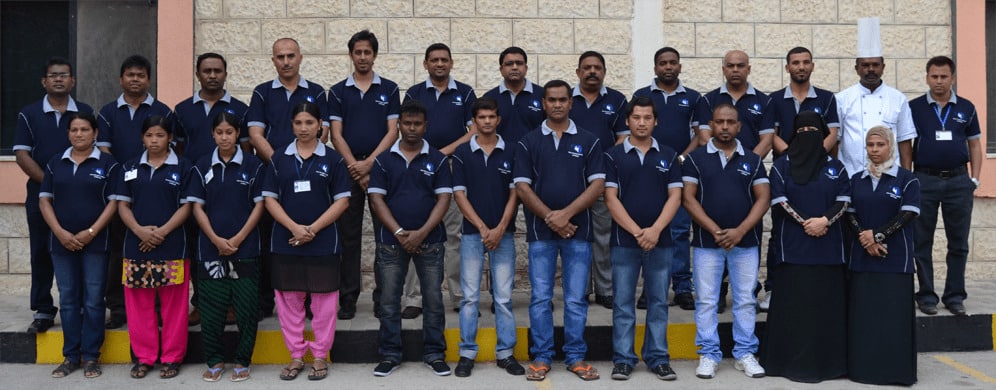Building good relations between workers and management is central to improving factory conditions in the Maliban factory in Jordan, where an active worker-management committee is making change happen.
5 August 2014

Ad-Dylayl, JORDAN – When female workers at the Maliban garment factory raised concerns about safety when leaving the factory and walking to their dormitories at night, factory managers listened patiently, asked questions, discussed options. Then, they did something that doesn’t always happen – they took action, and fast.
“Now we have lights and two security guards on the way to the dorms,” says M.G.M. Senarathna, 33, “and it took them less than 30 days to do this”.
That responsiveness, managers and workers say, is rooted in the strong relationship built by a factory-initiated platform for solving problems collectively, and came three years after signing up to participate in Better Work’s Advisory Services programme in 2008. Called “Performance Improvement Consultative Committees” (PICCs), these working groups comprise 8 to 10 elected representatives of both managers and workers, in equal numbers, and are tasked with developing and carrying out action plans for improvement after a factory has been assessed by Better Work on compliance with labour standards and laws.
In an industry where factory management and workers regularly misunderstand each other and often don’t see eye to eye, PICCs provide a safe, neutral space where both sides can raise concerns and work together toward solutions. PICCs have been praised by managers and workers alike, as well as government, donors and international brands, as among the most important tools to help factories not only address labour violations, but remain on the path of improvement. They work because the meetings bring traditionally divergent stakeholders to the table for a chance to have an honest dialogue.
That opportunity to speak and be heard is taken one step further at Maliban, where PICC membership mirrors the diversity on the factory floor. With a majority of Maliban’s workers being migrants from neighbouring nations, language can often be a significant barrier to workers’ ability to make their needs known. However, a typical PICC meeting at Maliban often involves translation in several languages, and representation for each of the ethnic groups employed at the factory. Despite cultural differences, workers from various nationalities are even advocating for each other. Although language barriers remain a challenge, the factory is constantly working to improve communication with workers.
“What is a remarkable achievement is at first, PICC representatives only spoke on behalf of workers of their own nationality,” says Shakir Mohammed Esmayeel, general manager of EAM Maliban, “Now issues are raised by members regardless the nationality involved. Jordanian PICC members try to help Bangladeshi workers, for example.”
This commitment to hearing from all workers has helped engender the kind of trust that workers say becomes the basis for loyalty. What’s more, Maliban’s PICC has been successful in resolving workplace challenges because it’s a direct line to top management, which means an added layer of assurance their issues will be heard and addressed.
“The great thing about PICC is that workers’ issues reach top management and not just middle management,” says Um Hazem, 41, a worker and PICC member, “The general manager, attends every meeting and we talk to him directly. This has given us great confidence to reach out.”
Maliban managers say PICCs have encouraged everyone within the factory walls to work together so the factory stays on a track of constant improvement. The committee’s success hinges on each monthly meeting starting with a roundup of changes that have or have not been made since the previous meeting.
“We look at the minutes of the previous meeting, and 90% of the time, issues are settled before the next meeting,” says Esmayeel.
Communicating with workers and keeping expectations clear has been critical in building and maintaining strong manager-employee relationships, which help prevent major crises and strife down the road, Esmayeel says.
“We go on a realistic basis,” he adds. “If workers are asking for things that are not doable, we tell them then and there that it is not doable. We don’t say we will look into if we won’t. And they understand this because they trust us. If we agree, things will get done.”
Like the lights that were added to walkways between the factory and the dorms. And a new menu provided at the canteen following complaints of unsatisfactory meals. And improved cleanliness of the bathrooms. Small things, workers say, but issues that can up over time and quickly erode worker confidence and loyalty when left unresolved.
It makes the bigger issues, such as a request for an increase in wages over what Maliban already provides based on the labour law, less urgent, workers say. The most important thing, they say, is that their voices are not only heard but their opinions are valued.
The PICCs also play a role in supporting and collaborating with trade unions rather than working in place of them. Where factories have unions present, worker representatives are invited by the union to serve on the PICC.
“The PICC has given us a greater voice,” Hazem says. “Management now pays more attention to us and to our demands. They respect us, especially us Jordanian women.”
Managers also value the role PICCs play in strengthening the manager-worker relationship in order for the factory to thrive in a competitive industry.
“We strongly believe that a happy and motivated workforce can only deliver a better product for the factory and buyers,”Esmayee concludes.